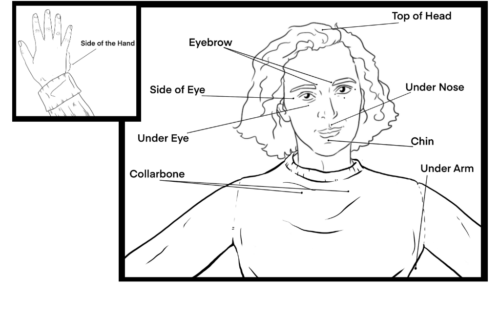
A Journey in Leadership to Inspire and Ensure Learning
WHAT’S UP: International educator and teacher trainer, Jane Hollands, helps IB school communities and schools pursuing IB PYP authorization with their curriculum implementation and development efforts. In this article, Jane shares experiences and real life examples from her journey in leadership in a way that inspires us to reflect upon:
- The importance of leaders having a clear vision for where they want their followers to go.
- The value, for everyone involved, of a leader embodying Servant Leadership.
- The power of being the type of leader who treats people in their community with respect, compassion, and appreciation.
JANE'S JOURNEY IN LEADERSHIP
When I
started working as a teacher, 30 years ago, it was with the aim to inspire
students and ensure learning. Passionate and excited about where this road
would lead me, I launched into the world of international education, and
started globetrotting.
After 10
years of working as a classroom-based educator, an opportunity arose to step
into a role of leadership. This was not an initial career aspiration, but the
longer I have worked at it, the more I realize it is part of what made me an
educator in the first place.
That’s
how my journey in leadership began. From Team Leader, to Curriculum
Coordinator, Head of Primary and Principal; I have held many different roles
since then. However, those core purposes of my early roles in education have
always remained; to inspire and ensure learning.
BE SURE TO HAVE A CLEAR VISION

I was asked early on if I could see what I wanted for the school I was leading – if I had a vision of it. Whilst I had many good ideas about the road ahead, I had not articulated the destination with clarity either for myself or those around me. To this day, I can see where I was standing and the school campus I was assessing when this point of self-realization and reevaluation was posed.
Taking the time to clarify this vision, resulted in the steps to get there becoming more logical and purposeful. I could explain with confidence as to what we were aiming to do and why. Simon Sinek, who has been inviting leaders to Start with Why for well over a decade now, highlights the importance of engaging the listener’s brain in order to have people join in the pursuit of goals. Only once I had truly listened to that which was driving me, could I hope to imbue that to others.
Clarity of destination is vital for the GPS to function and it is much the same when leading. When you can state the place you want to go, coupled with the beliefs behind it, those you ask to follow, do so with increased assurance instead of uncertainty. I am grateful to Julian Leah for asking me that question about vision in 2005.
TEACHERS SHOULD BE THE HAPPIEST PEOPLE IN THE WORLD
Teachers are the frontline workers for education. They are there to celebrate or commiserate throughout all of the learning discoveries and challenges of their students and the wider communities that are connected to them. They have the joy of writing reports, the opportunity to plan lessons, are invited to countless meetings and have job descriptions that seem to broaden daily. Knowing all that teachers do every day, I am well aware of how hard some days, weeks and even months can be for them. Therefore, I have always seen my role, as a teacher leader, to not focus solely on implementing structures to improve curriculum and efficiency, but to also consciously think about how to make their days happier through acts of kindness and compassion.

Happy Teachers = Happy Students. A simply equation that I follow with conviction, as it has tremendous implications. Part of my daily practice as a school head was to check on my students’ wellbeing during breaks and lunchtimes especially. If I noticed there were a few more accidents than usual, or a few more upsets than to be expected, I took it as a reflective indicator of teacher wellbeing. If my students were not okay, it was highly likely that my teachers were not either. An early finish, a cancelled meeting (that was not urgent and could keep until another day), a hot drink or perhaps even a sweet treat. These were all solutions that reaped endless rewards and most importantly, led to happier students the next day. And why was that important? Happy students learn better.

THE TYPE OF LEADER YOU ARE...MATTERS
We bring ourselves to leadership as much as we bring our ideas. Who we are is a reflection of what we do. In asking others to follow, I have always felt it necessary to lead by example. I have never viewed any job too big or too small. The opportunity to ‘walk the talk’ as a leader is ever present and indeed offers those around you, insight into your authenticity.
In 2018 an IB Workshop leader, Selda Mansur, observed Servant Leadership as she visited one of my schools. She said that (my) commitment and dedication to leading an IB World School by example via Servant Leadership is visible-audible and felt all around the school.
This was a term I was unfamiliar with, but once researched, it resonated.

With the increasing shift to value well-being in work, along with a growing awareness of the importance of ensuring environments that contribute positively to mental health (especially) post pandemic, it is a style that addresses many contemporary workplace needs.
I have often described leading a staff of teachers as being very similar to having a class of students. Stepping out of management, back into the classroom, on two separate occasions during my career, reaffirmed this belief. Just as I wanted to know the needs of students within my classrooms, I wanted to know the needs of the teachers within my staff. Only with this knowledge did I feel ready to contribute to the process of each teacher’s growth and development. Building the strength of my team meant building upon the capacities within it. I have heard it said that a leader is only as strong as the team she leads, but for me, I was only as strong as the team I was able to support.

RESPECT, APPRECIATION, AND COMPASSION
In thinking further about myself as leader, I also look to those who have led me. The examples that were most vivid were of those who inspired me to become more. In the late 90s I was fortunate enough to work for Lieutenant-Colonel Stuart Townsend of Hill House School, Knightsbridge, London. A uniquely qualified school leader who was in fact a retired British military officer and an accomplished athlete. He was a leader that imparted lessons to his staff that still leave me in awe today. The school had more than 1,000 students and well over 100 members of staff and yet, the moment you were in his presence, he immediately addressed you by name, inquired into your well-being and more often than not, reflected upon an aspect of your recent contributions to the school. He had an ability to make you feel both appreciated and important all at once. Staff at that school admired and revered him with a loyalty that I have rarely seen again. He was someone who valued and respected us and repeatedly he let us know it.

Appreciation amplifies respect. Letting others know that you see all that they do by expressing explicit gratitude once again speaks to authentic leading. Just as we know the power of feedback for motivating students, so too is the power of feedback and acknowledgement for motivating teachers. I used to write a page of comments with this in mind every time I proof read through a set of reports. The amount of teacher time that goes into writing reports can never be underestimated and had to be one of the first aspects I reflected upon. Often reading hundreds of reports, it took me extra time to write a personalized messaged to each teacher. The result? Teachers eagerly anticipated getting their reports back (rather than dread and fear of more work). They were curious and ready to do whatever more was needed. The simple act of writing this reflective comment changed the final days of reports from one of exhaustion to one of positive energy. Appreciation amplifies respect.

I would be remiss at this point if I did not mention compassion. One of my 5th grade students identified ‘compassionate’ as being a particular goal for the class to aspire to, after reading the Mission Statement of the International Baccalaureate Organization. Consequently, we looked to keep this word in view throughout the year and in the process, we discovered just how important it was. It was in their efforts to show compassion that they discovered not only how they could positively affect others, but also how they could experience better versions of themselves.

Compassion can encompass a vast array of sentiments and emotions, but in the workplace, I most directly connect it to empathy. Compassion, like appreciation, also requires time and can easily be forgotten in amongst busy days and timetables, but it is compassion that helps us to connect and form the relationship foundations that we rely upon for future progress.
Creating a culture of respect, appreciation and compassion leads to an environment that encourages participation and affirmation. They can be the difference between having to come to work or wanting to do the best job possible.
Be the Legacy you want to leave behind
To finish off, I once again think back to something that was said to me many years ago: When you leave (a school), what legacy do you hope to leave behind? I think we all hope to have a lasting impact whenever we are in a role of responsibility, whether it be of a student, a class or a whole school.
I think that the moments that have contributed most to any form of legacy I have left behind, are the ones that were a regular part of our everyday. It is not the grand gestures that many of my former teachers and students recall, it was the moments when they especially felt seen, heard, appreciated and inspired. As each new school year began, I would ask teachers to be mindful of such things and to look to be a teacher that is long remembered by their students, because they had motivated them to try harder, to persevere, to want to do and become more.
This article is by no means meant to be a comprehensive list of all that is needed to lead, but rather a selection of reflective highlights that have shaped the course of my leadership journeys thus far. The above ‘compass points’ have helped me to navigate difficult times, to achieve successes and to also realize the potential of my roles. They have guided me when I have become lost and reminded me of ways to move forward, each taking their moment to be my true North as needed.
I hope that within them, there is something to strengthen or affirm the individual leadership paths you are on.
I leave you with this quote from Mark Crowley, from the latest publication of his book, Lead from the Heart. In reflecting on his own leadership he wrote:

REFERENCES AND BOOKS TO EXPLORE
- Greg Thomas, “Personal Leadership and the Importance of Vision“, weLead.
- Gina Vild (2021), “The Astonishing Power of Kindness: Try this Single Act to Transform Hate into Harmony”, Psychology Today.
- The World Counts, “You Learn More When You are Happy”.
- Greenleaf Center for Servant Leadership, “What is Servant Leadership?”
- Melbado, “Importance of Trust and Respect in Leadership”, Center for Servant Leadership.
- Mark Tarallo (2018), “The Art of Servant Leadership”, Society for Human Resource Management.
- Simon Sinek (2009), Start with Why: How Great Leaders Inspire Everyone to take Action,
New York, USA, Portfolio/Penguin & Ken. - Kate Robinson (2022), Imagine If…Creating a Future for Us All, Great Britain, Penguin Random House UK
- Stephen Covey (1989), The 7 Habits of Highly Effective People: Powerful Lessons in Personal Change, New York, USA, Simon & Schuster
- Mark Crowley (2022), Lead From The Heart: Transformational Leadership For The 21 st Century (Revised and updated), USA, Hay House
MEET JANE

Jane Hollands (M. Educational Management, B.Ed) is an international educator whose career spans over 30 years. Born in Australia, she has lived and worked in Singapore, U.K., Switzerland, Denmark and is now in Spain. She is currently working as a teacher trainer, supporting schools that are pursuing IB PYP authorization and beyond. With ongoing determination to inspire and educate, her efforts to help IB communities with their implementation and development is with every hope that their students will become global citizens with the tools they need to effect positive change in the world around them. You can contact Jane at: louisianna@ymail.com
CLAIRE LILLYWHITE (cOMMENT SUBMITTED 13/06/2023)
“I was lucky enough to work with Jane and as I read this wonderful article a smile appeared as I remembered a happy time in my career. Jane is an inspirational leader, who is generous with her knowledge and time. She put the well-being of staff and students at the forefront of her thoughts before it was popular to include it as a popular phrase in school literature. She was the one who brought a coffee to my classroom after a cold outside duty, chocolate to staff meetings and would always give a helping hand wherever she could. Her knowledge and understanding of her staff, her students and their families created a warm, secure atmosphere for the whole community. Jane is the epitome of a progressive, open -minded and caring educator and communicator. I hope this comment goes some way to applauding some of her many attributes. I cannot thank her enough for the way she has and continues to inspire me.”
JOAN BOUVARD (COMMENT SUBMITTED 13/06/2023)
“I’ve had the honor and pleasure of having Jane Hollands as my principal for 5 years. I wish all leaders could be like her. She leads with so much empathy for teaching staff, students and everyone at school. She has so many skills; good decision making, great sense of humor, kindness to everyone, etc. She sets a great example of a true educator! She will always be an inspiration to me!”
MIHAELA MORELLO (COMMENT SUBMITTED 02/07/2023)
“I met Jane at a point in my career where I needed a spark to see again the beautiful world of education, and Jane provided just that. Reading this article reminded me of the many ‘lessons’ learned from Jane and the meaningful reflections we had the opportunity to have together. Jane has supported me throughout some big changes in my educational journey, always offering invaluable suggestions and feedback. Jane’s leading philosophy is an inspiring one as it focuses on the Servant Leadership model. Through Jane’s mentorship, I understood that a leader serves and works for everyone else in a school community, and not the other way around. This model infers a certain kind of modesty and humbleness that is essential to promoting a respectful and compassionate environment conducive for learning. Thank you, Jane for all your tremendous support!”
MORE FREE TRAINING RESOURCES FOR SCHOOLS
- “Overcoming Self-Sabotage: Helping Teachers Thrive”, by Carolyn Parse.
- “School Mission and Core Values: Matching Words with Action”, by Cecilia Bieganowsika.
- “The Benefit Mindset: A Sustainable Solution for Schools”, by Eleni Vardaki.




